Markus was briefly interviews by the local radio today about the research on the risk and management of boredom.
Länk till artikeln här
Markus was briefly interviews by the local radio today about the research on the risk and management of boredom.
Länk till artikeln här
Some months ago Markus was giving a presentation at TedX Umeå. Recently the recording of the talk became available. You will find it below.
Dear Colleague
We have the pleasure of inviting you to submit your work-in-progress to the 3rd international Workshop in the Organizing Extreme Contexts series. The theme of this year’s workshop is ”Doing research in Extreme Environments: What can be learned?” In the spirit of the workshop we are not looking for finished contributions but for interesting ideas that is worthwhile to pursue, and that will get the discussions going.
The workshop will be organized around plenary sessions where distinguished scholars will present published papers related to extreme contexts. Professor Ian Colville, Professor Sylvia Gherardi, Professor Hervé Laroche and Professor Annie Pye are our confirmed distinguished guest speakers and chairs. In addition, there will be parallel sessions with opportunities to share and discuss work-in-progress and roundtable sessions where participants have the opportunity to discuss specific challenges and issues raised by and from doing research in extreme contexts.
The workshop will be held at IAE Paris Sorbonne Graduate Business School, Paris, France, on October 19-20, 2017 (there will be no participation fee but because of that and the available time there is a limit to the number of participants (45)). Please find more details about the workshop in the attached call.
We are looking forward to seeing you in Paris!
Frederic Gautier, Genevieve Musca, Markus Hällgren and Linda Rouleau
The workshop is co-organized by GREGOR, IAE Paris Université Paris 1 Panthéon Sorbonne, CEROS, Université Paris Nanterre, France, TripleED, Umeå School of Business and Economics, Umeå University, GePS, HEC Montreal

After three days of intensive discussions and 27 papers later EGOS came to an end. The final was a joint discussion among the participants on where to go next. Some plans were made and now it is time to start implementing some of them. Exciting times ahead for Extreme Context Research (ECR)! Until next time.
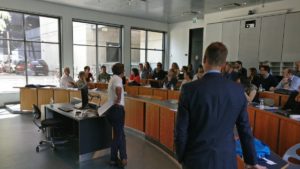 This is intended to be a short reflection on the activities today at EGOS. Together with professor Samer Faraj at McGill university (Canada) and professor Daniel Geiger (Hamburg University, Germany) I (Markus) convene a track on resilient organizing in extreme contexts and crisis at this years EGOS in Copenhagen, Denmark. As things have turned out it was one of the most popular tracks of the entire conference. The room that we are in sits about 45 people and it is absolutely packed. Starting of the track this morning it was marvelous to see how excited people were about the track. From the go-around in the presentations we could also hear that it was truly an interest in the topic that had drawn these people together.
This is intended to be a short reflection on the activities today at EGOS. Together with professor Samer Faraj at McGill university (Canada) and professor Daniel Geiger (Hamburg University, Germany) I (Markus) convene a track on resilient organizing in extreme contexts and crisis at this years EGOS in Copenhagen, Denmark. As things have turned out it was one of the most popular tracks of the entire conference. The room that we are in sits about 45 people and it is absolutely packed. Starting of the track this morning it was marvelous to see how excited people were about the track. From the go-around in the presentations we could also hear that it was truly an interest in the topic that had drawn these people together.
The first day went down well where the first to presentations was about managing drift, and managing meaning as a way to cope with constant adverse events in the case of adventure racing (Barton & Sutcliffe). The second paper shared the interest, but focused more on how to develop high reliability organizations in political conditions – seen not as outliers, but prototypes given how the world is developing as of today (Brown, Colville & Pye).
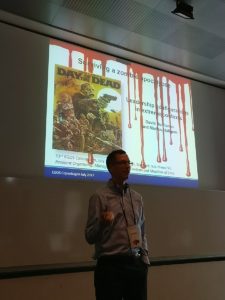 After the coffee break it was time for another round of presentations. The first of these dealt with one of the greatest challenges of our time, that is: how to survive a zombie apocalypse. Together with professor David Buchanan (Cranfield University, UK) I took the listeners to the awesome world of zombie movies, more precisely the cult classic ”Day of the Dead” in order to understand leadership configurations, and propose a way to access the notoriously difficult settings of extreme contexts. From the laughters, but also the serious comments the presentation seemed to have gone down well! The second presentation as done by Synnove Nessa that has an amazing case based on a hostile takeover of terrorists, and how BP managed that situation by developing what she called Heterarchical leadership, in the mid-lands between distributed and authoritative leadership. The third and final paper dealt with police pursuits and the coordination as such, and how this pattern changed as the pursuit went from rather ”cold” and structured to a ”warm” and unstructured, heavily improvised way of coordinating. (Wolbers & Kees-Schakel)
After the coffee break it was time for another round of presentations. The first of these dealt with one of the greatest challenges of our time, that is: how to survive a zombie apocalypse. Together with professor David Buchanan (Cranfield University, UK) I took the listeners to the awesome world of zombie movies, more precisely the cult classic ”Day of the Dead” in order to understand leadership configurations, and propose a way to access the notoriously difficult settings of extreme contexts. From the laughters, but also the serious comments the presentation seemed to have gone down well! The second presentation as done by Synnove Nessa that has an amazing case based on a hostile takeover of terrorists, and how BP managed that situation by developing what she called Heterarchical leadership, in the mid-lands between distributed and authoritative leadership. The third and final paper dealt with police pursuits and the coordination as such, and how this pattern changed as the pursuit went from rather ”cold” and structured to a ”warm” and unstructured, heavily improvised way of coordinating. (Wolbers & Kees-Schakel)
The proper call for papers are found Short version here, and a Longer version here
SPECIAL ISSUE EDITORS:
Sylvain Lenfle, Professor,
Conservatoire National des Arts et Métiers & Centre de Recherche en Gestion, Ecole Polytechnique, France
Christophe Midler, Research Director, Centre de Recherche en Gestion, CNRS/ Ecole Polytechnique, France
Markus Hällgren, Professor,
Umeå School of Business & Economics, Sweden
DEADLINE FOR PAPER SUBMISSIONS: FEBRUARY 2018
The strategic roles of innovation and exploration in today’s competitive environment have given birth to a research stream in the management of exploration projects for which neither the goals nor the means to attaining them are clearly de ned from the outset. This work bridges the project, innovation, entrepreneurship, and discovery management literature and has led to a new approach
to projects as experimental learning processes for which new management principles, such as selectionism and sequential learning, have been de ned. From the same perspective, this literature underlines the need to differentiate between the management processes for exploratory projects, since the traditional stage-gate approach generally leads to failure, and to design new evaluation methods adapted to their “expansive” nature. We are only at the beginning of the research; thus, the goal of this special issue is to continue to develop the research on exploratory projects. More precisely, we welcome contributions in the following areas:
We welcome all research methods (contemporary case study, quantitative analysis, historical research, and so forth), along with research coming from adjacent elds (entrepreneurship, management of extreme situations, and so forth).
SUBMISSIONS
Full papers must be submitted by 28 February 2018 via the journal submission site. Papers accepted for publication but not included in the special issue will be published later in a regular issue of the journal. If you have any additional questions, please consult any of the guest editors.
For further information please contact one of the guest editors of this special issue: sylvain.len e@lecnam.net / christophe.midler@polytechnique.edu / markus.hallgren@umu.se
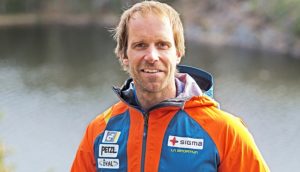
Fredrik Sträng is a long-time collaborator of TripleED. Fredrik has helped us tremendously by providing his valuable reflections about the soul of mountaineering and what the activity itself include through intensive discussions, diaries and other things. The first contact we had was in the wake of the horrible 2008 accident on K2, and now nine years later Fredrik goes back. As he mentions in the article below, he partly goes back to “face his demons”. We wish Fredrik all the best and that he will soon come home to tell his very interesting stories.
Here is a recent story about this project http://www.aftonbladet.se/nyheter/a/789oK/jag-maste-mota-demonerna-pa-k2
If you want to follow Fredrik´s adventures you can do it on his website www.strang.se or www.facebook.com/fredrik.strang
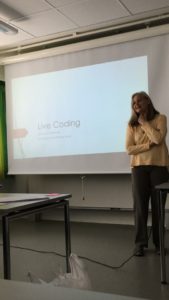 Today we had a extremely interesting and well attended workshop together with Professor Martha Feldman on the art of live coding, and how it may aid us in the discoveries of new and interesting things – rather than putting things into predefined boxes. I believe I can speak for everyone that there was some excitement involved in terms of trying out the ideas on one´s own data.
Today we had a extremely interesting and well attended workshop together with Professor Martha Feldman on the art of live coding, and how it may aid us in the discoveries of new and interesting things – rather than putting things into predefined boxes. I believe I can speak for everyone that there was some excitement involved in terms of trying out the ideas on one´s own data.
Personally I was so excited about the workshop that I forgot to take a picture, and therefore had to resort to stealing Jonny Holmströms..
Next stop is to try to use the method to find some clues about boredom and the use of routines..
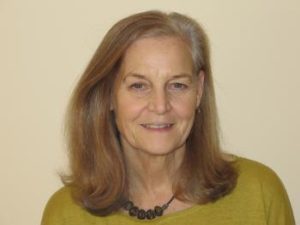 It is the absolute pleasure of TripleED to invite you to an exciting seminar with Professor Martha Feldman! Martha is perhaps most well known for her work on Organizational routines and use of qualitative methods.
It is the absolute pleasure of TripleED to invite you to an exciting seminar with Professor Martha Feldman! Martha is perhaps most well known for her work on Organizational routines and use of qualitative methods. Professor Martha Feldman, Professor of Planning, Policy, and Design, Management, Sociology, and Political Science; Johnson Chair for Civic Governance and Public Management at University of California, Irvine is arriving to USBE as a guest of TripleED. Martha will be working with members of TripleED on a paper on boredom and organizational routines in addition of giving a seminar during her stay. Martha will be in Umeå 2/6-6/6.
Professor Martha Feldman, Professor of Planning, Policy, and Design, Management, Sociology, and Political Science; Johnson Chair for Civic Governance and Public Management at University of California, Irvine is arriving to USBE as a guest of TripleED. Martha will be working with members of TripleED on a paper on boredom and organizational routines in addition of giving a seminar during her stay. Martha will be in Umeå 2/6-6/6.
Martha is perhaps most well-known for her work on organizational routines and qualitative methods.